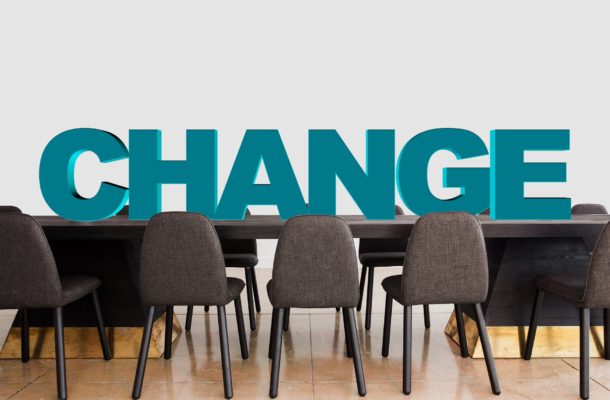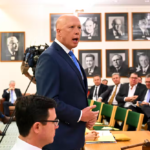Physician heal thyself

I knew little about the workings of government when I was first asked to serve on an advisory business committee in 1984. That group turned out to be the first of many, but in my 35 years of public policy engagement, I’ve seen a lot of hard work wasted and good intentions come to naught. All too often the policy recommendations they produce are impractical, self-serving or are left to sit on the shelf, rather than benefit the Australian people.
Such committees are created to advise governments and agencies on pressing social, economic and environmental issues, but all too often they are populated by well-respected figures whose achievements and knowledge lie some distance in the past. These people, however worthy and well-meaning, are wedded to the legacy attitudes and approaches which created the problems they are tasked to solve, while current power brokers are too busy to contribute, and no effort is made to find young people with fresh ideas and radical solutions.
While cynics might argue that committees are created by politicians to postpone decision making, rather than facilitate it, and that the committee structure itself is a barrier to blue sky thinking, I believe their operations could be greatly improved for the benefit of all concerned by better preparation and a more coordinated approach.
However expert and experienced a committee appointee may be in their job, it is impossible in the modern age to be au fait with every issue and development in any particular sector. Older committee members may be unaware of recent breakthroughs in their field, while younger ones may be blissfully ignorant of previous policy attempts, as it is a fair bet that every major issue has been examined by innumerable committees in the past.
I have worked with many incredible people, but, inevitably, the advice they give tends to be shaped by their own experience, interests and perspectives. Rather than pooling their diverse knowledge to create imaginative, consensual proposals, too many committees either re-fight old battles or squabble to promote competing vested interests. At best, they tend to produce vague aspirational pablum of little use to busy politicians looking for affordable, practical and tangible solutions to the pressing problems of the time.
The recent Australia 2030 innovation report offers a classic illustration of this phenomenon. It was produced by dedicated, well-intentioned individuals who are highly competent in their own fields of endeavor, but have little ‘corporate memory’ of the many similar documents which have been produced to gather dust before. They called for innovation, but in their report they reinvented the wheel.
The Cutler report was given a similar brief in 2008, for example, and came to much the same conclusions as the 2030 report. In fact, the Cutler document could have updated with less trouble and greater impact, allowing lessons to be learned from its failures and successes in the past. New concepts can only make headway if the failed ideas of the past are recalled, otherwise the same thoughts will be produced by people in the same roles in every succeeding generation.
This is not to blame individual members of indolence or insincerity. I have served on these committees too many times to have anything but the highest regard for my colleagues. However, we are invariably given topics that no one has time to research, and background material that no-one has time to read. We are ill-prepared for the task at hand and we have no memory of all that has gone before our appointment. It is little wonder that, for all our earnest deliberations, our conclusions are ignored by our target audience and make little impact on the wider world.
So how do we improve committee outputs and policy outcomes? As with every human endeavor, the key lies in improving the competence of personnel and building stronger systems. So how do you bring competence to this process? By offering training and building on experience, rather than being constrained by it.
The answer to better policy does not lie with government ministers. If they are lucky, our political leaders may spend 18 months or two years heading any particular department, before the next reshuffle moves them on. All politicians have their policy interests, yet they are routinely appointed to posts they have no expert knowledge in. In the end they are experts at politics, and each appointment is merely another step in their career or a pawn played by others in the wider political game.
The public service is the counterweight to this political maelstrom, a bastion of continuity and jealously guarded independence in a highly contested and uncertain world. Yet, those stolid attributes also prevent the public service from abandoning traditional approaches for radical new points of view. Officials who may anticipate 20 years in the public service do not want to put their name to unproven ‘out of the box’ measures whose failure would imperil their careers. Their interest lies in business as usual and their advice will inevitably follow suit.
This twin dilemma is, of course, why expert committees are needed. At their best they can offer subject expertise and fresh thinking, tailored to focus on the problem at hand. But to be effective, they must work on a firm foundation of shared knowledge and build on the lessons learned from innumerable committees before. What their members need is a short period of formal familiarisation with both current developments and past policy paths, a holistic view of the sector to offer alternative perspectives, and some common grounding in new ways to approach problem solving – such as design thinking – to encourage a fresh but collective approach.
Much like Australia itself, the current committee system does a decent job. An argument for improvement is not strengthened by pretending the current situation is a crisis beyond compare. Many eminent people have produced excellent suggestions through hard-working committees which have been adopted, in whole or in part, and have made Australia a better place.
That said, we can always do better. Committees which inevitably urge others to reform and improve can reform and improve themselves first. This requires practical measures, rather than uplifting exhortation. The constant mantra that we have to do better does not take us a step further forward until that step is made. As Nelson Mandela once said, “Hope is irrelevant, action is what is needed”.
The committees we create – and the public pays for – are not action-oriented, they are not always staffed by the right personnel, nor are they given the resources and training they need to succeed. Spending just a little time and money before they begin their work could generate much greater benefits if their proposals are not only better as a result, but are more likely to be implemented.
Merely vowing to appoint the right committee members to future bodies isn’t enough to remedy this sorry state of affairs. If that were a solution, it would already be the norm. Nor is yet another think tank required. Many of these bodies, some of them proud to promote a particular point of view, others professing independence from the political fray, already exist and one more would add little to the equation.
What I propose is the creation of a new body to ensure that committees of all stripes are briefed properly and given the support and resources they require to carry out their designated task. This new entity would offer background material – independent of any public service inertia or vested interest spin – to all members to ensure they are not only up to date with current developments, but informed about past policy attempts. It would also offer advice on the best way to frame practical recommendations which politicians of all parties would be minded to implement, rather than ignore.
A new entity which trained committee members in modern methods of brainstorming ideas and offered ‘corporate memory’ of previous attempts would build a stronger, wider cohort of potential committee members and, vitally, could train new and younger people before they ‘join the club’.
Rather than offer suggestions on one particular sector of policy, the body would be the catalyst which helps committees of all kinds produce better proposals in the future, benefiting ministers, the public service and – most importantly — Australia’s citizens.

Peter Fritz AO is Chairman of Global Access Partners and Group Managing Director of TCG. He chairs a number of influential government and private enterprise boards and represented Australia on the OECD Small and Medium Size Enterprise Committee.












John Rimmer
March 7, 2018 at 8:37 am
A great proposal Peter. I have been an observer (and participant) of such committees for 30 years, since my thesis on the topic in the 1980s canvassed similar conclusions. Since then the problem has only worsened.
Anonymous
March 9, 2018 at 3:57 pm
Thank you John.Your validation of the proposition much appreciated.p
Alan Stevenson
March 11, 2018 at 11:11 am
I also have served on various committees and have been frustrated. Recently I joined a U3A committee and was amazed at the ability of one of its members to get things done. She quietly sits until just before the vote, then puts in one or two suggestions, which are usually agreed to. She then works in the background, contacting relevant personnel and hey presto, what everyone thought they wanted comes to fruition. On thinking back over fifty odd years, that is exactly what was wanted in many fruitless discussions. Some people have the ability to see the goal and then get others to achieve it. I would like to suggest that we all look out for these people (who are not always obvious, since they tend to keep a low profile) and use their innate abilities to get things done. I still don’t know how she does it but she does.